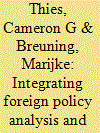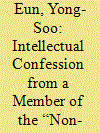| Srl | Item |
| 1 |
ID:
111632


|
|
|
|
|
| Publication |
2012.
|
| Summary/Abstract |
We argue that role theory offers the possibility of integrating Foreign Policy Analysis (FPA) and International Relations (IR) theory. While role theory was originally adapted for use by U.S.-based FPA scholars, it was later picked up by European scholars as well as the Constructivist IR community. The ISA Workshop that generated this special journal issue was designed to bring together scholars from these various research traditions to pursue integration and synthesis. The resulting papers contained in this issue have set the stage for a productive conversation that has continued well beyond the initial workshop. Role theory does appear to offer the possibility of integration and even synthesis across FPA and IR as demonstrated in the following papers. We believe that this special issue highlights numerous avenues to continue the fruitful development of this research program.
|
|
|
|
|
|
|
|
|
|
|
|
|
|
|
|
| 2 |
ID:
165473


|
|
|
|
|
| Summary/Abstract |
David Lake wrote that International Relations (IR)1 will be a more diverse and better field of study if we embrace varied “life experiences and intuitions,” especially those of “marginalized” scholars, about politics and how the world works. Although concurring with his admonition, I also believe that his call for “greater diversity” in IR and his approach to realizing it need to be subject to critical scrutiny, being reconsidered in terms of reflexivity—more specifically, self-reflection by “marginalized” scholars. For this reason, as a “non-white” scholar working in a “non-Western” (or, in Lake’s words, “underrepresented”) IR community, I want to make my own confession to better understand what is at stake in promoting diversity in the academy from a different angle.
|
|
|
|
|
|
|
|
|
|
|
|
|
|
|
|